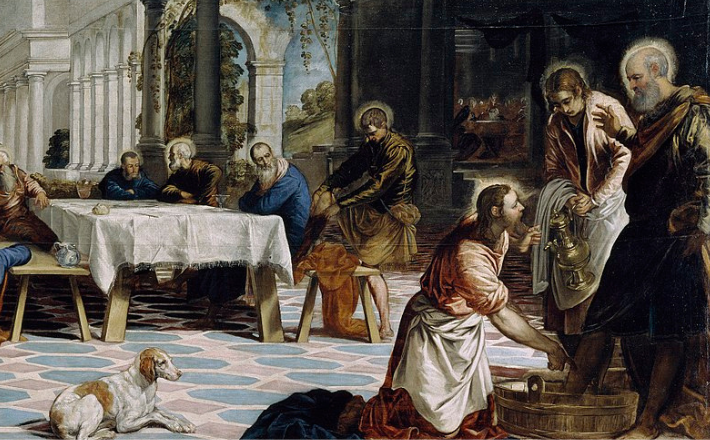Commentary on John 13:1-17, 31b-35
“Unless I wash you, you have no share with me” (John 13:8b). These words leapt from the pages of Scripture as though daring me to remove my shoes and let Jesus wash my feet. And like Peter, my initial impulse was to say no: “You will never wash my feet” (verse 8). Yet that is what Jesus is asking us to do, to take off our shoes and let him wash our feet.
The Gospel narrator begins this story by inviting the reader to stand with Jesus during the most consequential period in his life and ministry. In verses 1–3, we learn that everything is changing, and Jesus is the only one who seems to know. Jesus knows, perceives, or is aware of (Greek eido) the gravity of the moment and its implications for his life and for his disciples’ future. He is aware that his hour has come and that his ministerial journey in “this world” has come to an end. And he is confident that his relationship with God is secure and that he has loved (Greek agapao) “his own” without restraint and “to the end.”
Two expressions are worth exploring in these initial verses. The phrase “to the end” (Greek telos, end) is somewhat ambiguous. It can function as a time marker that coincides with the “hour” of Jesus’ departure—Jesus loved them to the conclusion of his ministerial journey. Or it can function as the noun in a qualitative adjectival phrase—Jesus loved them completely, wholeheartedly, irrefutably. In either case, the narrator affirms that Jesus’ love is sustainable and without limit or equivocation.
The second is the narrator’s emphasis on love. Significantly, the narrator chooses the Greek verb agapao, meaning to prove or exhibit love through action. Jesus proved his love for his own by engaging in concrete practices that transformed their lives and preserved their soulish, physical, psychic, and material well-being. Through proclamation, teaching, and acts of healing, delivering, saving, welcoming, feeding, interceding, intervening, and advocating, Jesus evinced his love to the end.
Jesus’ practice of love must have made the sting of Judas’s betrayal and capitulation to the devil’s influence even more painful (verses 2, 18–31a).
The word “devil” (Greek diablo) means slanderer or false accuser, that which entices and deceives. The various translators acknowledge the devil’s presence but disagree about the entity’s capacity to influence Judas’s decision: the devil decides (New Revised Standard Version Updated Edition), puts the impulse into Judas’s heart (New Revised Standard Version, King James Version, New King James Version), or prompts Judas to act (New International Version). Importantly, diablo does not imply the power to supplant human will. Hence, Judas can choose whether to remain Jesus’ faithful disciple or to succumb to the diablo’s deceptive lure. Judas chooses the latter.
Against this backdrop of awareness, love, and betrayal, Jesus sits at table with his disciples for a final meal. Each of the Gospel writers recounts the meal, but they disagree about the meal’s significance and its connection to the Passover. The Synoptic Gospels situate the meal on the first evening of Passover, during which Jesus institutes the Lord’s Supper, a deeply formative eucharistic practice for the Christian church. The Gospel of John tells a different story.
In the Fourth Gospel, the meal takes place the day before the Passover begins. Undeterred that the guests are already eating, Jesus leaves the table, removes his outer robe, ties a towel around his waist, pours water into a basin, and begins to wash his disciples’ feet and dry them with the towel. We don’t know if Peter was the first disciple Jesus approached or if he was simply the most reactive, but Peter will have none of it: “Lord, are you going to wash my feet? … you will never wash my feet” (verses 6, 8).
Foot washing was an accepted and expected act of hospitality toward guests whose feet were soiled from traveling the dusty roads of the villages and towns throughout ancient Palestine. The task was typically performed by servants in wealthier homes or by guests themselves in more meager homes. It was also common practice for servants to wash their masters’ feet or for students to wash their teachers’ feet. But protocol would not have supported a master washing his disciples’ feet.
Peter’s objection, in other words, is not about foot washing per se, but about the disruptive nature of Jesus’ offer to wash his disciples’ feet. Not only does Peter view Jesus’ actions as a violation of protocol. He also views himself, and likely the others, as unworthy of such a great outpouring of love from the one they regard as Lord. And Peter was right: Jesus’ actions were improper. But he was also wrong: Peter’s awareness (Greek eido) of the gravity of the situation was lacking, as was his understanding (Greek ginosko) of the ritual’s significance.
In verses 8–11, Jesus reveals the significance of the ritual: “Unless I wash you, you have no share with me.” The word “share” (Greek meros) implies division, portion, or piece, a reminder to Peter and the others that they are co-sharers with Jesus and, by implication, with one another. With this new understanding, Peter offers Jesus his hands, feet, and head. And though Jesus chides Peter for going a bit overboard, he knows Peter finally understands.
Jesus also invites us to understand. “Do you know what I have done to you?” (verse 12). Jesus does not wash his disciples’ feet for the sake of instituting a new ritual. He is reminding us that a share with him includes following his example of sustained agapeic love for one another and for the many others we encounter along the way (verse 15).
In verses 31–35, Jesus amplifies this idea, reminding us again that we are co-sharers with him. Throughout his life and ministry, Jesus revealed himself (Greek doxazo) as the Son of Man, God’s emissary on earth (12:44–50; 13:31). Thereby, he also glorified or made evident (Greek doxazo) God’s presence among us. Now that his journey is ending, Jesus invites his co-sharers to live as an expression of his presence on the earth: To exemplify agapeic love for one another, so that “everyone will know” we are his disciples. To embody his ministerial vision as our own and do the work necessary to bring that vision to fruition.
On Maundy Thursday, we receive Jesus’ commandment anew: “Just as I have loved you, you also should love one another.” May we permit Jesus to lovingly wash our feet and, as agapeic co-sharers with Jesus, preserve one another’s soulish, physical, psychic, and material well-being—you know, wash one another’s feet.


March 28, 2024